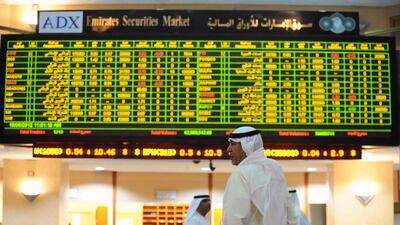The Abu Dhabi Securities Market index closed the week up 4.9 per cent on Thursday, taking its gains since the start of the year to 36.75 per cent. Over the past year, the bourse has soared 68 per cent.
ADX now has a market capitalisation of Dh1.18 trillion ($321.6bn), with the most recent impetus coming from the listing of Alpha Dhabi, a broad investment group with 40,000 employees and revenue of Dh3.8bn.
The company's shares listed on Sunday and have gained 16.4 per cent since, giving It a valuation of Dh174.6 billion. That makes it the fourth-biggest company on the exchange by market cap, behind International Holdings Company (which owns 44 per cent of Alpha Dhabi and is valued at Dh224bn), Etisalat (valued at Dh193.1bn) and First Abu Dhabi Bank (Dh183.2bn).
"It's been an excellent year for ADX," said Mohammed Ali Yasin, chief strategy officer at Al Dhabi Capital. "May was a strong month for many markets and June continued to be for ADX. It has continued to lead the MSCI Emerging Market Index," he added.
MSCI's emerging market index comprises the biggest and most liquid stocks listed on emerging market exchanges around the world.
The ADX's gains this year can be attributed to a number of factors, starting from the appointment of a market maker in the last quarter of 2019, which "introduced stability [and] lowered volatility" in trading, Mr Yasin said.
The increase in the free float – the amount of shares available for investors to buy – of companies like Etisalat, FAB and Adnoc Distribution also increased their weighting in emerging market indexes, leading to inflows into these shares from institutional investors that passively track the benchmarks, he added.
"The third main factor is ... the unbelievable returns that IHC's share price has made. A year ago, IHC's share price was below Dh29 per share. Today, its Dh123 per share. It's not the same company – during the year there was a lot of spinning off of its private joint stock companies, and we saw of course the introduction of Alpha Dhabi," Mr Yasin said.
The gains made by ADX are in some ways a reversion to the mean, according to Junaid Ansari, head of investment strategy and research at Kamco Invest.
"Even with the gains this year, the performance of ADX is broadly in line with gains in the broader GCC index since 2014," Mr Ansari said. "ADX has gained 60.1 per cent since 2014, versus the GCC index gain of 58.7 per cent."
Government-related entities are also playing a role, with a widening of ownership expected in Taqa's shares following its merger with Abu Dhabi Power Corporation last year, leaving the latter with a 98.6 per cent stake. Adnoc Distribution's broadening of its investor base has also attracted investor interest, he added.
There is "minimal pressure" on the gains made so far this year being reversed, Mr Ansari said.
"Investors would take cues from [second quarter] earnings and the oil market. And both these factors are not expected to see significant decline based on consensus expectations," he said.
The potential for more IPOs on the back of Yahsat's listing later this month and continued high oil prices "gives us indication that ADX could consolidate its position and maybe continue making these gains", Mr Yasin said.


